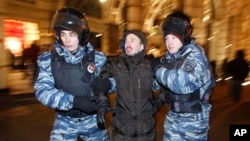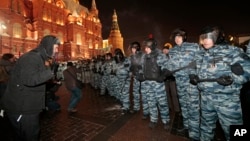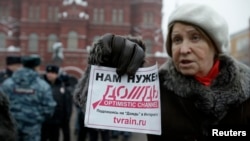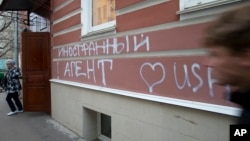A Russian court for the first time has sentenced an activist to three years in prison under a 2014 law for repeatedly protesting without permission.
Amnesty International called for activist Ildar Dadin to be released immediately after a judge at Moscow’s Basmanny Court issued the decision Monday. The sentence was a year longer than what prosecutors were seeking.
The law allows Russian authorities to hand down criminal sentences of up to five years in prison after four unsanctioned demonstrations within a six-month period.
Amnesty called Dadin’s jailing a “shocking and cynical attack on freedom of expression” using “draconian law” restricting public assemblies.
Dadin was first detained in 2012 for protesting the conviction of anti-government demonstrators. He was detained several times since and placed under house arrest in January after his fourth unsanctioned demonstration since 2014.
Denis Krivosheev, deputy director for Europe and Central Asia at Amnesty International, told VOA three more people are being investigated under the law. He said they expect another conviction pretty soon. “And, I'm saying we expect [a conviction] because, given the state of Russia's criminal justice system and its judiciary, it would be a miracle to expect that there would be a fair trial."
One of the people being investigated is 75-year-old Vladimir Ionov, who was the first to face criminal charges under the 2014 law, but has not yet been sentenced.
Broadcaster targeted
Dadin’s sentencing came the same day Russian prosecutors raided independent television station Dozhd (Rain) TV to probe alleged concerns of compliance with labor and licensing as well as ’extremism’ and ‘terrorism.’
Rights groups said the raid was an obvious attempt to pressure the station, one of the few remaining broadcasters in Russia willing to give voice to critics of the Kremlin and President Vladimir Putin.
The New York-based Committee to Protect Journalists expressed alarm at what it sees as Russia’s harassment of Dozhd.
In 2014, Russian cable providers dropped the channel after pressure from authorities over a poll questioning if surrender to the Nazis would have been better than the human costs of the 1940s siege of Leningrad.
Despite its limited reach, unlike state broadcasters, Dozhd refuses to bow to authorities and often interviews opposition politicians and activists.
Soviet era comparisons
Rights groups say the tightening of restrictions on voices critical of the Kremlin is a pattern reminiscent of Soviet times.
“It seems that the government wants those people who are critical toward its policies and practices to voice their criticism solely within the confines of their kitchens, just like back in the Soviet times, said Tanya Lokshina, Russia program director for Human Rights Watch in Moscow.
“It’s a very grim, dramatic situation,” she said. “It seems that the government is effectively trying to exterminate independent criticism by attacking non-governmental organizations, by attacking independent media outlets, by attacking individual critics,” Lokshina said.
Since Putin returned to the Kremlin in 2012, amid massive anti-government protests, Russia has enacted tighter controls on freedom of assembly, the press, foreign organizations, and groups that receive foreign funding.
‘Foreign agents’
Russian prosecutors in recent months blacklisted three U.S. groups, the National Endowment for Democracy, Open Society Foundations, and the U.S.-Russia Foundation for Economic Advancement and the Rule of Law, under an “undesirables” law.
More than 100 Russian organizations have been labeled as “foreign agents,” a term with Soviet-era connotations of spying and accepting foreign funding for activities deemed political. Rights groups say many have scaled back operations or closed down because of the label.
Activists say the crackdown demonstrates Russian authorities’ fear of greater instability as the country heads into recession, while maintaining what is widely seen as direct military support for rebels in eastern Ukraine and growing military action in Syria.
"Russia is heading for tougher times, economically, first of all,” says Amnesty’s Krivosheev.
“And, it would seem that the government's response would be to expect more protests and to preempt it by making it more difficult, and those who put their head above the parapet to face very serious reprisals,” Krivosheev said.
“I think that’s the government preparing for tougher times ahead," he added.







